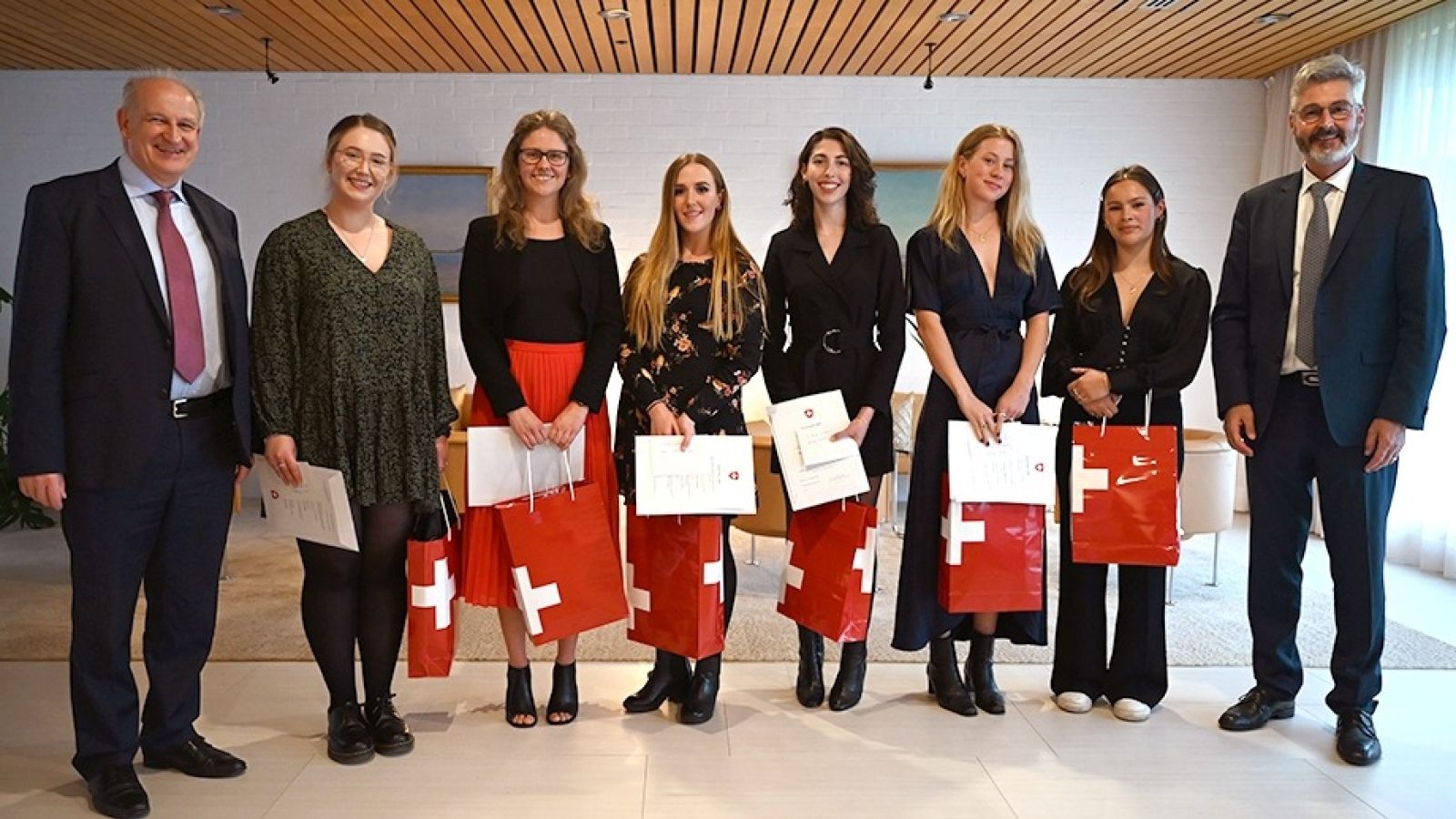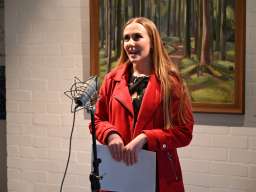2020 Swiss Prize: Challenges and Transformation

In-person winners of the 2020 Swiss Prize. Image: Evana Ho
By Evana Ho
The topic of this year’s 2020 Swiss Prize was resonant on a number of levels. The annual essay competition sees ANU students submit an essay in one of the official languages of Switzerland that they’re studying (French, German, and Italian) on the designated topic. This year, it was '21st century Switzerland: challenges and transformation'.
Currently in its 22nd year, the Swiss Prize is a collaboration between the Embassy of Switzerland in Australia and the ANU School of Literature, Languages and Linguistics. For the first time in its history, the award ceremony was conducted as a hybrid event, with students and guests participating at the embassy as well as from home. The COVID-19 pandemic had provided both this challenge and transformation. Lurking in the background too was the outcome of the US Presidential Election, which had yet to be determined at the time of the Swiss Prize ceremony.
The essay topic gave students ample ability to engage with the major issues of this year. As Ambassador of Switzerland to Australia Mr Pedro Zwahlen told the audience, students submitted essays on a variety of topics ranging from climate change to gender equality, migration, the Black Lives Matter movement, and the current pandemic.
With the choice of the topic, said Ambassador Zwahlen, “we wanted to recognise that the world is currently entering a new period of historic uncertainty.”
Ambassador Zwahlen recalled the concerns of his friends of a possible nuclear war between the Soviet Union and the United States when he was 17 years old. Then, when he was 21 – roughly the age of the essay writers – the Iron Curtin fell.
“The US was active as a democratic leader of the world – with all its flaws,” said Ambassador Zwahlen. “But we were thriving and quite happy with it. And with the negotiation of the Kyoto Protocol throughout the 90s until 1997, it seemed that humanity had started coming to grips with the fundamental threat of global warming.”
Thirty years on, he acknowledged that the world looks different and that it’s more difficult to be optimistic today.
“But let me remind you of another difference between then and now,” he added, on a more positive note. “Connectivity. It's a good moment to mention it since we have first time an online connection directed to a group of participants.”
“You have tools to connect, dear students, and develop a power which I could only dream of at your age. […] You have the collective ability to influence and shape the world together in a much more effective manner and direct manner than I could have thought of when I was your age.”
With that, Ambassador Zwahlen congratulated the ANU students for their hard work and commitment to learning a Swiss language.
“Learning another language requires persistence and dedication, but believe me your efforts are worthwhile,” he said. “You strengthen your position in the world, and by demonstrating openness and confidence, you build trust with your peers. This effort will reward you in the future over and over again.”
Speaking for his third and final time at the Swiss Prize ceremony, ANU Pro-Vice Chancellor (Innovation & Advancement) Professor Michael Cardew-Hall said the event was the first official face to face function he had participated in this year. He was honoured that it was at the Swiss Embassy.
The Australian National University, Professor Cardew-Hall said, considers Switzerland a really important partner. He went on to describe its excellence in innovation, fruitful research collaborations between the ANU and Switzerland, and student exchanges over the past five years.
“It really is to foster that inter-cultural understanding, educational and scientific understanding between Australia and Switzerland,” said Professor Cardew-Hall. “And I think in these times of uncertainty, the more we can do these exchanges and understand each other's cultures, the better.”
He repeated the aims of the Swiss Prize: celebrating multilingualism and cultural diversity, promoting the three official languages of Switzerland, and introducing Australian students to Swiss culture and society.
“I'm an engineer. My ability in languages is less than zero most of the time,” said Professor Cardew-Hall. “I'm truly stunned that we have students at the ANU who can write an essay, and argue a case around a very contemporary topic, in a language which is not their mother language. I think you need to be congratulated for being able to do that.”
The announcement of the prize winners in French, German, and Italian was interspersed with a vocal performance by CASS alumna AJ America, accompanied by ANU School of Music Classical Guitar teacher Minh Le Hoang.
Award winners
French
1st: Lily Henke - La Suisse au 21ème siècle et le plafond de verre (Switzerland in the 21st century and the glass ceiling)
2nd: Patricia Oliveira Calado - Sauvegarder la qualité de vie de nos aînés (Protecting the quality of life of our elders)
3rd: Raili Koskinen - Le défi du maintien de la représentation romanche en Suisse au XXIe siècle (The challenge of maintaining the Romansh representation in Switzerland in the 21st century)
German
1st: Olivia Vane-Tempest - Offen und geschlossen: Änderungen der Migrationspolitik der Schweiz im 21. Jahrhundert (Open and Closed: Changes in Swiss Migration Politics in the 21st Century)
2nd: Sarah Biggins-Gilchrist - Klimapolitik der Schweiz (Climate Politics in Switzerland)
3rd: India Rowe - Die Schweizer Armee: ein Paradox? (The Swiss Army: a Paradox?)
Italian
1st: Feruglio, Alley (Alessandra) - La Svizzera all’Avanguardia della Sostenibilità (Switzerland at the Avant-garde of Sustainability)
2nd: Clunies-Ross, Eliza - Il ruolo della lingua nell’unità e nella prosperità della Svizzera (The role of language for the unity and prosperity of Switzerland)
3rd: Piccinin, Ashley - La Sfida dell’Immigrazione (The Challenge of Immigration)















